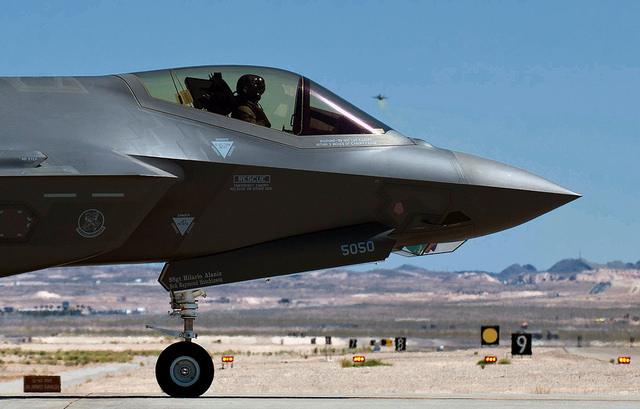There are two paths you can go by (but in the long run…)
Posted By Andrew Davies and James Mugg on December 7, 2016 @ 14:30

As we wrote back in March [1], the Senate Foreign Affairs, Defence and Trade References Committee held an inquiry into Australia’s acquisition of the F-35 Joint Strike Fighter. The election campaign in the middle of the year slowed things down, but the Committee tabled its report [2] in October, to little fanfare. Given that it’s one of Australia’s most expensive purchases (at least until the future submarine and frigate programs overtake it), it’s worth noting the outcome.
There was a dissenting report from the Australian Greens and some additional comments from the Nick Xenophon Team, which we’ll discus later. But we’ll start with the majority findings. The Committee found that:
‘… the F-35A is the only aircraft able to meet Australia’s strategic needs for the foreseeable future, and that sufficient progress is being made in the test and evaluation program to address performance issues of concern.
[But] in light of the serious problems that led to a re-baselining of the F-35 program in 2012, and the ongoing issues identified by the United States Director of Operational Test and Evaluation (DOT&E), the committee retains a healthy scepticism towards assurances by Defence regarding cost, schedule and capability outcomes of the F-35A.’
We don’t think that’s a surprising outcome. In fact, it’s pretty much what ASPI’s been saying for the past five years. The early years of the program were plagued by cost overruns and schedule slippages. But the program has performed much better since the 2012 rebaselining and recent program data [3] shows unit costs coming down and the production schedule stabilising.
But the F-35 isn’t yet at the point of fielding a fully operational software load, and the Pentagon’s Operational Test and Evaluation team continues to harbor significant reservations [4] about the aircraft. The OT&E team are professionally ‘glass half empty’ types, and their report needs to be read in context [5], but the fact remains that we aren’t there yet. That’s why the Committee made this recommendation:
‘The committee recommends that the Department of Defence develop a hedging strategy to address the risk of a capability gap resulting from further delays to the acquisition of the F-35A. The strategy should be completed by 2018 and capable of implementation by 2019 at the latest.’
That’s the ‘Plan B’ we suggested in our submission [6], though we’re not claiming any great insight for suggesting a backup plan for a vitally important acquisition that continues to face technical risks—that’s just prudent planning. We don’t think the backup’s likely to be needed, but we also don’t think it’ll take much work to develop. For interoperability and cost reasons, an additional tranche of Super Hornets would be hard to beat. Recent sales to Kuwait and Canada will keep the production line open into the 2020s [7], buying us a little extra time to make a firm decision, though the RAAF’s 1980s Hornets won’t go far beyond the early 2020s.
The report also includes a recommendation to establish Australia as a regional maintenance hub for the F-35—an outcome that has already been delivered on [8]. Then there’s the Greens’ dissenting report, which recommends that Australia follow Canada’s example [9] and ‘withdraw from the F-35’ (although they haven’t [10]) and run a competition. Given that such a competition would almost certainly conclude [11] that the F-35 was the best option, with Super Hornets the next best choice, we’d end up in pretty much the same place.
The Nick Xenophon Team’s additional comments echo similar sentiments regarding the Canadian example, but go further to suggest that Australia should team up with Canada to run a competition (which should include a fly off) to ‘sanity check [our] decision making’. Allowing that the F-35 might well win said competition, the NXT then advocates the development of a similar ‘Plan B’ hedging strategy. In order to head off future price shocks, they recommend a hardball acquisition strategy:
‘A fixed price contract for the aircraft should be negotiated with liquidated damages to be passed through the US Government to Lockheed Martin in the event that the company does not deliver in accordance with contracted performance or schedule.’
It wouldn’t be the first time Australia has done that—our Wedgetail AEW&C aircraft ended up costing Boeing a lot of its own money [12] when development costs rose and the schedule slipped. But it’s not clear how well that strategy would work with the F-35. As a member of the international F-35 consortium, Australia’s exempt from foreign military sales fees (typically 3–4%), but will have to take the spot price when we buy. (Recall that costs are coming down.) If we were to try for a fixed price instead, Lockheed Martin and the US government would factor a risk premium into the price, and might also apply a fee.
In short, we can’t see that much is gained from either of the alternative suggestions. It seems that all roads lead to the same Plan A and Plan B, which isn’t such a bad thing in any case.
Article printed from The Strategist: https://aspistrategist.ru
URL to article: /two-paths-can-go-long-run/
URLs in this post:
[1] back in March: /f-35-keep-calm-but-have-a-plan/
[2] its report: http://www.aph.gov.au/Parliamentary_Business/Committees/Senate/Foreign_Affairs_Defence_and_Trade/JointStikeFighter/Report
[3] recent program data: /2017-usaf-budget-f-35a-price-and-production-schedule-update/
[4] harbor significant reservations: https://www.flightglobal.com/news/articles/pentagons-top-weapons-tester-doubts-f-35a-capabilit-428786/
[5] needs to be read in context: http://nationalinterest.org/blog/the-buzz/pentagons-operational-test-evaluation-office-determined-17472
[6] in our submission: /wp-content/uploads/2016/02/160219-ASPI-F35-submission.pdf
[7] open into the 2020s: http://www.defensenews.com/articles/kuwait-qatar-fighter-jet-deals-move-forward-likely-putting-boeing-fighter-jet-production-into-the-2020s
[8] already been delivered on: http://www.minister.defence.gov.au/2016/11/08/jsf-announcement-to-create-defence-industry-jobs/
[9] Canada’s example: /trudeaus-folly-canadas-new-interim-fighters/
[10] they haven’t: http://news.nationalpost.com/news/canada/trudeau-government-to-contribute-another-36-million-to-f-35-fighter-jet-program
[11] would almost certainly conclude: https://www.cdainstitute.ca/blog/entry/canada-s-fighter-replacement-what-will-the-field-look-like-in-five-years
[12] a lot of its own money: http://www.globalsecurity.org/military/world/australia/wedgetail.htm
Click here to print.